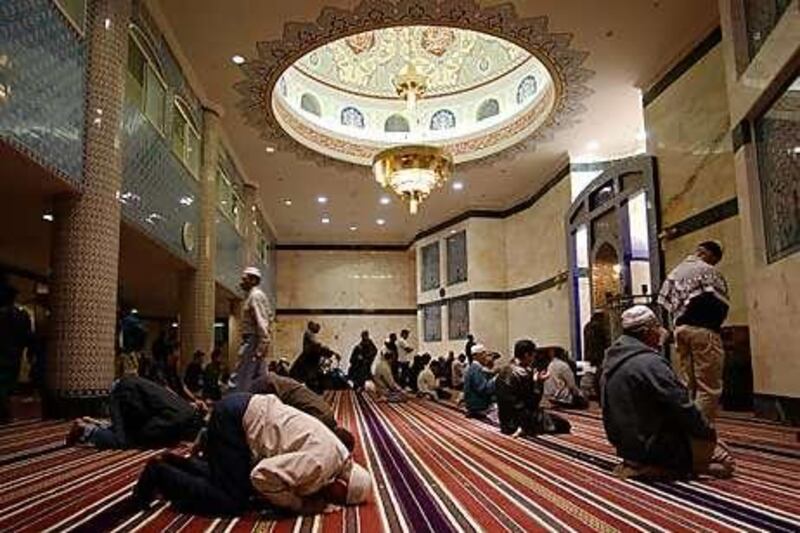LOS ANGELES // Even though some US extremists do not believe Mahmoud Harmoush deserves the full range of freedoms granted every American citizen by the US constitution, the imam still believes in seeking to understand their opposition.
Based in Southern California, he is one of several American Muslim leaders who are trying to open Islamic centres and mosques across the United States, from Tennessee to Ground Zero in New York, but are facing criticism and attacks from a vocal minority. "I was not expecting such opposition, but you have to look at the situation in this country," said Mr Harmoush, 50, who emigrated from Syria in the mid-1980s. "People are looking for someone to blame for the economy, the wars overseas, immigration. Out of ignorance, we are the target for them to throw stones at."
Mr Harmoush has led the Islamic Centre of Temecula Valley, some 145km south-east of Los Angeles, since 1999, when there were just a handful of Muslim families in the area. But the centre, currently based in a rented, former warehouse where people pray and study, is now too small for the 150-200 families who use it. After raising around US$750,000 (Dh2.75 million) - "dollar by dollar" from the community, said Mr Harmoush - the centre bought 1.6 hectares of land in 2000. Although far short of the $3m needed to construct the planned 2,300 sq m centre and mosque, the centre sought and obtained local planning permission.
But then the pastor of the Calvary Baptist church near the planned centre spoke out. "The Islamic foothold is not strong here, and we really don't want to see their influence spread," Pastor Bill Rench told the Los Angeles Times this week. "There is a concern with all the rumours you hear about sleeper cells and all that. Are we supposed to be complacent just because these people say it's a religion of peace? Many others have said the same thing."
With a planning meeting scheduled for August 18 in Temecula, which has a population of around 105,000, residents opposed to the mosque have banded together to form a group called Concerned Community Citizens and have started circulating a petition. But Mr Harmoush also expects many supporters to be present at the meeting, including colleagues from the Interfaith Council of Temecula and Murrieta Valley, which includes representatives of different Christian denominations, Judaism and Baha'ism among others.
"A Christian lady wrote me a letter saying she felt really sorry we're facing all these difficulties and she donated $100," said Mr Harmoush, who is an instructor of Arabic and Islamic culture at the California State University in San Bernardino. "There's just a small minority of extremists and people who act out of ignorance and hatred for no justifiable reason, especially against the Muslims of North America."
He said the centre regularly held open houses for anyone who wanted to drop by and learn about their activities. With the help of local doctors, the centre also sponsors a health clinic for the poor, which is open to all regardless of their faith, he said. Southern California has about 80 mosques to serve some half-a-million Muslims, said Ahmed Azam, president of the board of trustees of the Islamic Centre of Hawthorne, a city of about 85,000 in south-western Los Angeles County.
"The first challenge for us as American Muslims is facing all the misconceptions about Islam because people react to what they hear in the media," he said. "The second challenge is trying to understand why, when there are about one billion Muslims in the world and somebody does something bad, people look at us as if we're behind it." Jon Stewart, the liberal host of The Daily Show, a television news comedy, recently showed a segment of mostly Fox News clips in which the different mosques planned around the country were presented as a sinister development.
He concluded by saying that perhaps Christian Americans were most worried by the competition posed by Islam in the US marketplace of ideas. In Murfreesboro, Tennessee, a proposed mosque has become a campaign issue among the three Republican Party candidates in a congressional primary. At public hearings, angry residents threatened to boycott any builder who worked on it. Attempts to win political support among mosque opponents have not always gone smoothly. Sarah Palin, an unannounced but leading candidate for the Republican presidential nomination in 2012, recently drew ridicule when she appeared to make up a word and urged American Muslims to "refudiate" plans to build a mosque close to the site of the World Trade Centre in New York. She mixed up the words "repudiate" and "refute".
The mosque would be part of a proposed cultural centre called Cordoba House, named after the Cordoba Initiative, a group that works to break down barriers between the Muslim world and the West led by Imam Feisal Abdul Rauf. Michael Bloomberg, the mayor of New York City who is Jewish, came out against Mrs Palin's comments. "Sarah Palin has a right to her opinions, but I could not disagree more," he said. "Everything the United States stands for and New York stands for is tolerance and openness."
Mr Azam said the growth of mosques and Islamic centres was not only good for American Muslims, but also made it easier for those who believed the community needed to be closely tracked. "By allowing them to open, you can then monitor them, learn from them and hopefully give them a chance," he said. @Email:sdevi@thenational.ae






